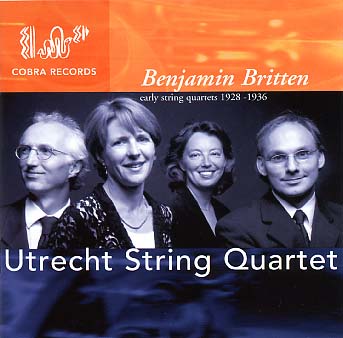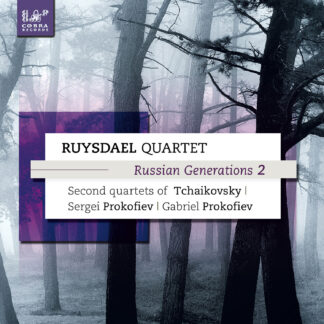Early Britten by Utrecht String Quartet
Price range: €8.99 through €16.99
Description
Benjamin Britten
early string quartets 1928 – 1936
” …Bridge insisted on the absolutely clear relationship of what was in my mind to what was on the paper. I used to get sent to the other side of the room; Bridge would play what I’d written and demand if it was what I’d really meant….He taught me to think and feel through the instruments I was writing for.”
Benjamin Britten
The idea of this recording is to display the young Britten’s enormous talent for highly original work, even before becoming a student of composition and writing the better known later string quartets op.25, op.36 and op.94. As a player or listener we can observe the astonishing development in his writing throughout the eight years of his life covered by this recording .
There are other important instumental compositions from this very early period in Britten’s life : the Phantasy Quartet for Oboe and string trio (1932), the Quartettino (1930), the Elegy for Viola solo (1930)and the Phantasy for string quintet including a second viola (1932). Due to the time limitations of a CD, we chose to restrict ourselves to the string quartets alone, the final decision being whether to record the Quartettino in place of one of the other quartets. The result lies before you! We have chosen to present the music in the chronological order of the first versions of the compositions.
Interestingly, Britten had intended to write a five movement string quartet, combining the Three Divertimenti with two other movements that only exist in loose sketch form. The single movement Alla Marcia had also originally been intended to form a part of the same quartet that was to be named Alla Quartetto Serioso.
Benjamin Britten
What do we actually associate with the name Benjamin Britten?
The composer of the War Requiem, Simple Symphony, or of Peter Grimes of course: but we really know rather little about him and his compositions, especially his early chamber music. He was able to write in all styles, including occasional and incidental music for theatre, radio, film and concert hall.
Like Mozart, Britten was able to complete most of a composition in his mind so that the process of putting it down on paper became almost mechanical.
Additional information
| Label | |
|---|---|
| Format | |
| Type |





